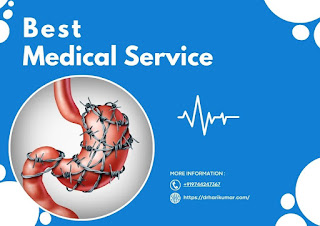The Ultimate Guide to Understanding Liver Function and Common Disorders
written by: liver specialist in kochi
The liver, a remarkable organ nestled in the upper right side of the abdomen, plays a pivotal role in maintaining our overall health. From detoxification to metabolism, nutrient storage to hormone regulation, the liver performs a multitude of essential functions that are vital for our well-being. In this comprehensive guide, we will delve deep into understanding the intricate workings of the liver, explore its various functions, and shed light on common disorders that can affect its health and functionality.
Anatomy of the Liver
The liver is a large, reddish-brown organ with a unique structure that sets it apart from other organs in the body. It consists of lobes and segments, each with specific roles in carrying out its functions. Blood vessels, bile ducts, and hepatic cells intricately contribute to the liver's ability to process nutrients, filter toxins, and produce essential substances.
Functions of the Liver
1. Detoxification
The liver acts as a detoxifying powerhouse, filtering and removing harmful substances such as toxins, drugs, and metabolic byproducts from the bloodstream. It metabolizes these substances into less harmful compounds, facilitating their elimination from the body.
2. Metabolism
Metabolism is a key function of the liver, encompassing processes like carbohydrate, protein, and fat metabolism. The liver regulates blood glucose levels by storing excess glucose as glycogen and releasing it when needed. It also synthesizes proteins, converts amino acids, and processes fats for energy production and storage.
3. Nutrient Storage
The liver serves as a storage depot for essential nutrients and vitamins, including glycogen, vitamins A, D, E, K, and minerals like iron and copper. These reserves play a vital role in maintaining metabolic balance and meeting the body's nutritional needs.
4. Hormone Regulation
The liver plays a crucial role in hormone regulation by metabolizing and clearing hormones from the bloodstream. It also produces important hormones and enzymes involved in digestion, blood clotting, and immune function.
Common Liver Disorders
1. Fatty Liver Disease
Fatty liver disease, characterized by the accumulation of fat in liver cells, can be non-alcoholic (NAFLD) or alcoholic (AFLD). It is often associated with obesity, diabetes, and high cholesterol levels, leading to inflammation, liver damage, and potential progression to more severe conditions like cirrhosis.
2. Hepatitis
Hepatitis refers to inflammation of the liver, commonly caused by viral infections (hepatitis A, B, C, etc.), excessive alcohol consumption, autoimmune diseases, or exposure to toxic substances. Symptoms may include fatigue, jaundice, abdominal pain, and liver dysfunction if left untreated.
3. Cirrhosis
Cirrhosis is a late-stage liver disease characterized by scarring and irreversible damage to liver tissue. It can result from chronic alcohol abuse, viral hepatitis, fatty liver disease, or other underlying liver conditions. Cirrhosis impairs liver function, leading to complications such as portal hypertension, ascites, and hepatic encephalopathy.
Diagnosis and Treatment Options
Diagnosing liver disorders often involves a combination of medical history assessment, physical examination, blood tests (liver function tests, viral markers), imaging studies (ultrasound, CT scan, MRI), and liver biopsy for definitive diagnosis. Treatment strategies vary depending on the specific liver disorder but may include lifestyle modifications (diet, exercise), medication (antivirals, immunosuppressants), and in severe cases, liver transplantation.
Maintaining Liver Health
Maintaining liver health is paramount for overall well-being. Adopting a healthy lifestyle with balanced nutrition, regular exercise, limited alcohol consumption, and avoidance of harmful substances can significantly reduce the risk of liver disorders. Routine medical check-ups, vaccination against hepatitis viruses, and early detection of liver abnormalities through screening tests are also crucial preventive measures.
Conclusion
The liver's intricate functions and susceptibility to various disorders highlight the importance of understanding and caring for this vital organ. By gaining insight into liver function and common disorders, individuals can make informed choices to support liver health, minimize risk factors, and seek timely medical intervention when needed. A holistic approach to liver care, including healthy habits and regular medical monitoring, is key to ensuring optimal liver function and overall wellness.




Comments
Post a Comment